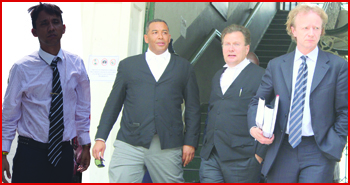 The case of Caleb Orozco and interested parties versus the Attorney General and interested parties began on Monday, May 6th in the chambers of Chief Justice, Kenneth Benjamin. Even before the beginning of the case, it was billed to be filled with drama and excitement and two days into the arguments it has not disappointed, at least not from the theatrics that are accompanying the case.
The case of Caleb Orozco and interested parties versus the Attorney General and interested parties began on Monday, May 6th in the chambers of Chief Justice, Kenneth Benjamin. Even before the beginning of the case, it was billed to be filled with drama and excitement and two days into the arguments it has not disappointed, at least not from the theatrics that are accompanying the case.
Religious organizations who are opposed to Orozco’s position have held prayer vigils in Corozal and other parts of the country. In Belize City a sizeable one was held in front of the Supreme Court on Monday night and throughout the proceedings, some have gathered outside the courthouse to hold prayer meetings.
Orozco is taking the Attorney General to court challenging the constitutionality of Section 53 of the Criminal Code. That section reads “every person who has carnal intercourse against the order of nature with any person or animal shall be liable to imprisonment for ten years.” Orozco, an openly gay man, says that the law violates his right to privacy, dignity and equality. He has retained the services of Senior Counsel Christopher Hamel Smith, Senior Counsel Simeon Sampson, Lisa Shoman and Westmin James a lecturer at the Faculty of Law, at UWI’s Cave Hill campus. But Orozco is not alone in his bid; he is joined by the Commonwealth Lawyers Association, the Human Dignity Trust and the International Commission of Jurists, who also have representation by Queen’s Counsel Lord Peter Goldsmith and Godfrey Smith.
Defending the law are attorneys in the Attorney General’s Ministry, Nigel Hawke, Herbert Panton, Illiana Swift and Magali Perdomo. Also seeking to have the law remain in place are the churches, who have also been added to the case as interested parties. They too have legal representation with Senior Counsel Rodwell Williams, Eamon Courtenay, Michel Chebat, Jacqueline Marshalleck and Christoper Coye representing them.
It is a power pack of attorneys, 15 in total, and 5 solicitors who crammed inside the CJ’s chambers starting on Tuesday, May 7th. They were not alone in the courtroom as others interested in the hearings including the Bishop of the Roman Catholic Church, Dorrick Wright were also in attendance. Security was elevated for the hearings as personal searches were conducted on anyone attempting to enter the courthouse. The media was relegated to wait outside the courthouse on instructions of the CJ and Orozco himself was afforded personal security guards to protect him.
The first two days were afforded to lead attorneys Christopher Hamel Smith and Lord Peter Goldsmith. Both argued that Orozco’s constitutional rights were violated by section 53 of the Criminal Code. Both had much to say each putting forth their positions both speaking in excess of four hours each.
In his arguments, Smith put forth that Section 53 violates the constitutional rights of his client, Caleb Orozco. He pointed out that while it is facially neutral with no reference to gender being made, in practice, every time his client, who is a homosexual man and who is predisposed to engage in sexual act with another man does the act, he is in effect committing a crime albeit that he is not caught. He in fact is an un-detained felon because he has committed a criminal act, even if it is the privacy of his home. This, he said, has caused his client great trauma and has gone against many of his constitutional rights including his right to privacy and freedom of expression. He concluded by asking the court to strike down Section 53 to the extent that it infringes on his clients rights and no more.
For his part, Goldsmith went one step further and suggested that we need to look at international norms when interpreting section 53. He cited authorities from various jurisdictions including India, South Africa and the United States among other jurisdictions to show that these countries have all used the generally accepted international principles in interpreting their domestic legislation so as to give as wide a scope in interpreting their domestic legislation. Most pertinent was his argument where a Texas State law which prohibits homosexuality was stuck down by the U.S. Supreme Court.
Before conclusion of hearings on Tuesday, attorney for the AG’s Ministry rose and made preliminary objections to Smith’s submission and including his references three constitutional provisions 11,12 and 16, which did not form part of his original pleadings in his claim before the Supreme Court. The CJ asked that that matter be addressed on Thursday morning after which Hawke will make his defence and thereafter the attorney for the churches will have their input.
The case is expected to conclude on Friday May 10th.




